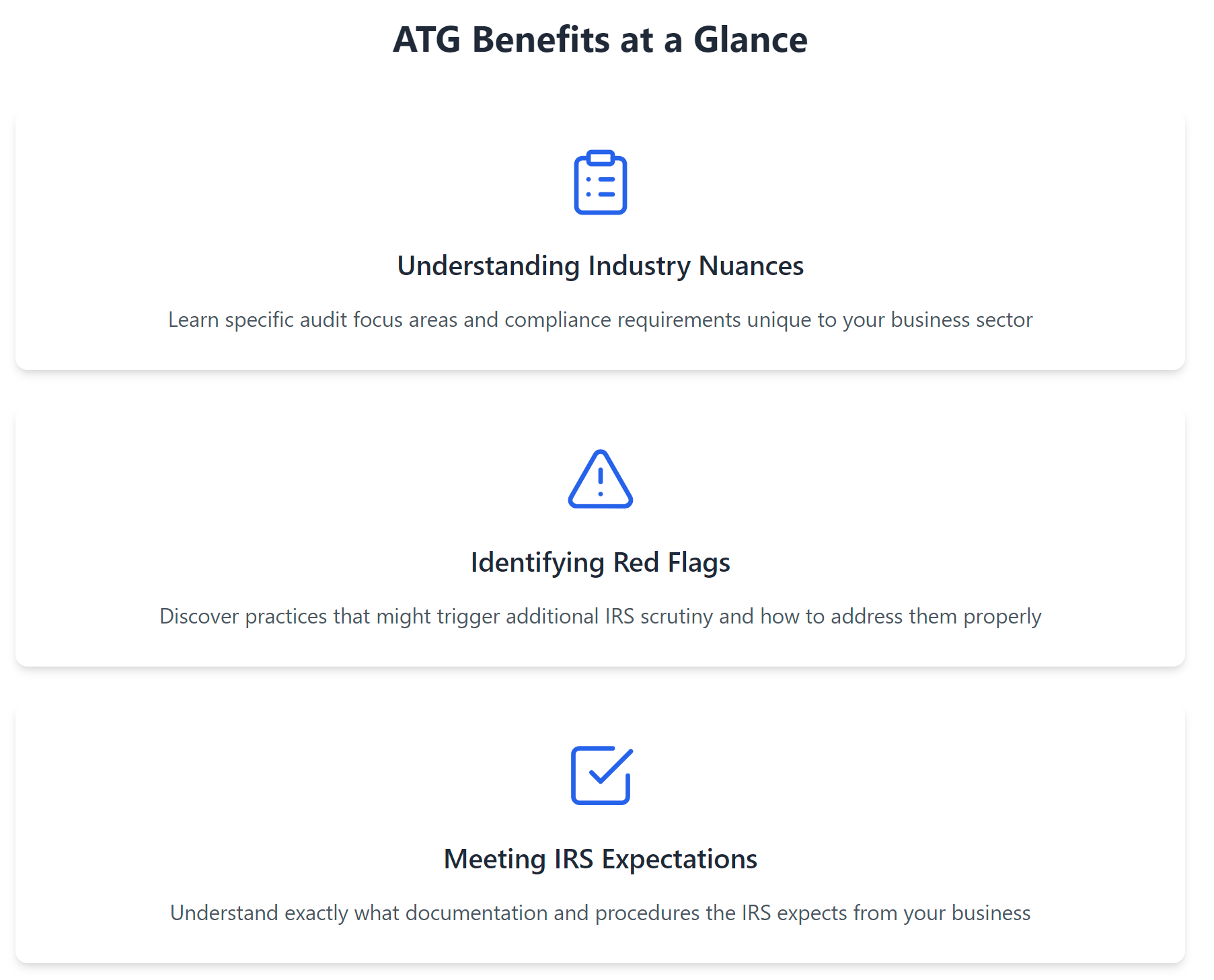Hey everyone, it’s XOA TAX, your trusted source for all things tax-related. Ever wished you could peek behind the curtain and see what IRS auditors are looking for when they review tax returns? Well, you actually can! The IRS publishes Audit Techniques Guides (ATGs) that provide valuable insights into their audit procedures for specific industries and issues.
These guides are like a roadmap for IRS examiners, outlining the areas they focus on and the common red flags that trigger audits. And the best part? They’re publicly available on the IRS website!
Why Should You Care About ATGs?
Think of ATGs as your secret weapon for staying ahead of the curve. By reviewing the ATG for your industry, you can:
- Understand Industry Nuances: Each industry has unique aspects that auditors focus on. ATGs highlight these areas, allowing you to ensure compliance.
- Identify Potential Red Flags: Learn about practices that might raise eyebrows at the IRS, helping you avoid potential issues.
- Meet IRS Expectations: Gain a better understanding of what the IRS expects from businesses like yours regarding record-keeping and tax compliance.

How Can ATGs Benefit Your Business?
Here’s how ATGs can give you a leg up:
- Proactive Compliance: Identify areas where your business might fall short of IRS expectations and take corrective action before an audit happens.
- Audit Preparedness: Familiarize yourself with the auditor’s perspective and gather the necessary documentation in advance, reducing stress and potential issues during an audit.
- Peace of Mind: Knowing what to expect can alleviate anxiety and help you approach a potential audit with confidence.
Real-World Examples
To illustrate the value of ATGs, let’s look at a few examples:
- Construction Industry: This ATG covers issues like worker classification (employee vs. independent contractor), accounting for long-term contracts, and substantiating costs.
- Restaurants: This guide addresses topics such as tip reporting, cash receipts, and inventory accounting.
- Retail: This ATG delves into areas like sales tax collection, inventory valuation, and related party transactions.
By reviewing these guides, businesses in these industries can gain valuable insights into the IRS’s focus areas and ensure they are meeting their tax obligations.
Where Can You Find ATGs?
Visit the IRS website for a complete list of ATGs: https://www.irs.gov/businesses/small-businesses-self-employed/audit-techniques-guides-atgs
A Word of Caution
While ATGs are incredibly useful, it’s important to remember that:
- They might not be updated as frequently as tax laws change. The IRS typically updates ATGs every few years, but tax laws can change more frequently. Always double-check current regulations and consult with a tax professional for the latest guidance.
- They are not comprehensive audit manuals. They provide a framework for understanding audit procedures but don’t encompass every aspect of the process.
Recent Developments
The IRS is increasingly utilizing data analytics and technology in its audit procedures. This means that staying current with the latest IRS practices and ensuring accurate record-keeping is more critical than ever. ATGs can provide a solid foundation for understanding these evolving procedures.
COVID-Era Changes
The COVID-19 pandemic significantly impacted IRS procedures, leading to changes in deadlines, filing requirements, and communication methods. While many of these changes were temporary, some have been incorporated into standard procedures. It’s crucial to stay informed about the latest updates and consult the IRS website or a tax professional for specific guidance.
State-Specific Considerations
Remember that while ATGs provide valuable insights into federal tax audit procedures, state tax laws and audit practices can vary significantly. It’s essential to consider state-specific regulations and consult with a tax professional familiar with your state’s requirements to ensure comprehensive compliance.
IRS Modernization Initiatives
The IRS is actively pursuing modernization initiatives, leveraging technology to enhance efficiency and improve taxpayer services. These initiatives include expanding online services, implementing data analytics for risk assessment, and enhancing cybersecurity measures. Staying informed about these developments can help you navigate the evolving tax landscape effectively.
XOA TAX Is Here to Help
Navigating the complexities of tax compliance can be challenging. At XOA TAX, we’re dedicated to helping businesses of all sizes understand and meet their tax obligations. Whether you need assistance with understanding ATGs, preparing for an audit, or managing your day-to-day tax needs, our team of experienced professionals is here to support you.
Contact us today to schedule a consultation:
Website: https://www.xoatax.com/
Phone: +1 (714) 594-6986
Email: [email protected]
Contact Page: https://www.xoatax.com/contact-us/
Disclaimer: This post is for informational purposes only and does not provide legal, tax, or financial advice. Laws, regulations, and tax rates can change often and vary significantly by state and locality. This communication is not intended to be a solicitation, and XOA TAX does not provide legal advice. XOA TAX does not assume any obligation to update or revise the information to reflect changes in laws, regulations, or other factors. For further guidance, refer to IRS Circular 230. Please consult a professional advisor for advice specific to your situation.




 anywhere
anywhere  anytime
anytime